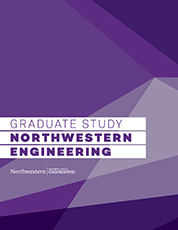A Passion for Problems
Sydney Bernstein talks about how the EDI program helped prepare her to work at IA Collaborative and how she approaches her work through human-centered design.
For Sydney Bernstein (EDI ‘22), the best thing about a problem isn’t its solution.
Bernstein finds joy in the problem itself.
 Problems allow Bernstein to pursue her passion for engaging with other people and listening to their stories. If a solution emerges, all the better.
Problems allow Bernstein to pursue her passion for engaging with other people and listening to their stories. If a solution emerges, all the better.
Since graduating from Northwestern's Master of Science in Engineering Design Innovation (EDI) program, Bernstein has worked as a design research associate for Chicago-based IA Collaborative, a design consultancy with several EDI alumni team members.
“I am a people person. My job is literally to go, meet, and observe humans from all walks of life,” she said. “Everyone has such a unique story and narrative, and I am so fortunate that my work allows me to go hear them.”
In her role, Bernstein coordinates observation sessions where she strives to go beyond what people tell her about a product to see how they actually interact with it.
“The biggest part of my role is translating the hundreds of observations we learn during the sessions into insights that are actionable for our clients,” she said. “My role plays a big part in uncovering those human behavior-based insights that push our clients past the obvious.”
To uncover those insights, Bernstein leans heavily on her experiences in the EDI program, which educates students in the art and science of human-centered design. This approach dives deeply into the end-users’ perspectives to deliver products customers actually want instead of those designers think they want.
Bernstein’s EDI journey began in 2020 following her graduation from Northwestern with a bachelor’s degree in biomedical engineering. She said the transition from the more rigid science-based research of her undergraduate work to the more observational, dynamic research of the EDI program wasn't easy.
“EDI taught me to embrace challenges, stay curious, and not to be afraid to question the status quo,” she said. “I have EDI to thank for pushing me into this discipline and providing me with the skill set to pursue a career I find so much joy and passion in.“
The value of her EDI education comes through in more than just the technical skills Bernstein applies with her clients at IA Collaborative. She said the EDI program helped enhance her ability to think through complex problems.
In the process, Bernstein said she learned to embrace the uncertainty inherent in human-centered design.
“Perhaps the most intimidating part of working in design and innovation is that you have to admit to yourself and to the client at certain points of the project that, yes, the answer right now is unknown, but that is just a part of the process,” she said. “EDI provided me with a skill set that allows me to lean into that and persevere until we find the true meaning of what we are looking for.”
In her first six months on the job, that true meaning was found on projects that helped a company improve shipping logistics, assisted another with remote patient monitoring, and delved into the ins and outs of sports innovation and the fan experience for a major Midwestern university.
“The best part of my work is that I am always facing new problems and puzzles to figure out,” she said. “No two projects or days are ever the same.”
What is the same is her approach — thanks to her finding joy in problems and leveraging what she learned in the EDI program.
“EDI prepared me to think expansively and look for inspiration everywhere,” she said. “I follow the exact same mindset in my approach at IA Collaborative.”

